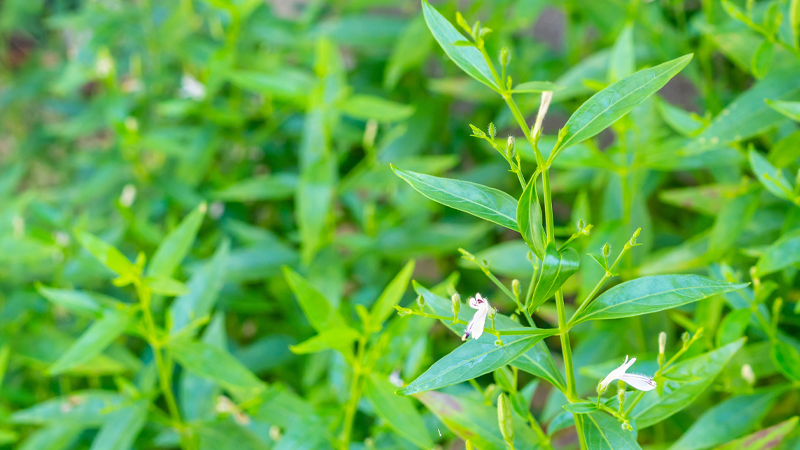
Many studies have been focused on therapeutic agents either in pursuit of new chemical entities or repurposing existing drugs for treatment of COVID-19. Some researchers have also explored the use of natural products either as immune boosters, prophylactics or chemotherapeutics.
Researchers at the Nigerian Institute for Pharmaceutical Research and Development (NIPRD) have discovered NIPRIMUNE, an immune-modulatory phytomedicine, from the plant Andrographis paniculata.
Although the Federal Ministry of Health has refused to invest in clinical trials of the plant since it proved effective against COVID-19, it is on record that Thailand in January 2021 approved Andrographis paniculata for the management of COVID-19 infection. Also, Andrographis paniculata is one of the basic ingredients in Prof. Maurice Iwu’s COVID-19 formulation that is presently going through clinical trials.
Previous studies have shown that A. paniculata is one of the plants used for treating febrile illnesses possibly due to malarial and bacterial infections in local communities in Nigeria. It is locally called Jogbo because of its bitterness but popularly called Mejemeje (seven-seven) among Yoruba speaking natives in Nigeria because an average dosage comprises seven leaves eaten raw once or twice daily for about five days in the treatment of febrile illness or chronic debility and some herbalist also recommend it for treatment of hypertension.
Antibacterial activities of both aqueous and ethanolic leaf extract have been reported. It is a common belief that any bitter leaf is medicinal and must be useful in treating fevers. Other bitter plants so administered in Yoruba land include Oruwo (Morinda lucida), Dongoyaro (Neem tree – Azadirachta indica), Ewuro -Bitter leaf (Vernonia auriculifera) and Quinine tree (Cinchona officinalis) to mention a few. A. paniculata is an erect annual herb extremely bitter in taste in all parts of the plant body. The plant is known in northeastern India as “king of bitters”, and belongs to the family Acanthaceae.
The phyto-constituents of Andrographis paniculata plants which has been well elucidated include: diterpenes, flavonoids, iterpenoid, lactones, alkanes, ketones, aldehydes, andrographolides (which is the major constituent), paniculides, farnesols, polyphenols, arabinogalactan, and several other sub-units of andrographolides.
Director General and Chief Executive Officer, NIPRD, Dr. Obi Peter Adigwe, told journalists: “We are proposing Niprimune capsule with Andrographis paniculata ingredient for the treatment of COVID-19. We projected it for COVID-19 but it needs to pass through those processes before it would be approved. We (NIPRD) were the first to discover that this particular process has effect on the immune system and since it has effect on the immune system, we ran it through the artificial intelligence and machine learning capabilities we had, and realised that this would be good for COVID-19 since it affects people whose immune system are compromised. We have done all the pre-clinical tests that show us that this will be very good, and we now need to move to the clinical stage which is expensive, and this is what we need funding for, but nobody is coming forward for assistance.”
Adigwe said researchers at NIPRD had to use machine learning and artificial intelligence capacity to identify that Niprimune may have activities in the management of COVID-19.
Also, the National Agency for Food and Drug Administration and Control, (NAFDAC), has given approval for the safe consumption of Niprimune, a drug developed for boosting immunity to COVID-19.
NIPRD, which disclosed this said already, it has begun a clinical trial on the efficacy of the COVID-19 immune vaccine. Adigwe said the next stage for NIPRD is to embark on clinical studies to prove that Niprimune is effective for the management of COVID-19.
Meanwhile, in late December 2020, the government of Thailand approved a pilot study of the use of the southern Asian herb andrographis (Andrographis paniculata) to treat early symptoms and reduce the severity of COVID-19.
Researchers have established the anti-Severe Acute Respiratory Syndrome Coronavirus type 2 (SARS-CoV-2) activity of Andrographis paniculata extract and its major component Andrographolide in human lung epithelial cells and cytotoxicity evaluation in major organ cell representatives.
In conclusion, the study provided experimental evidence in favour of A. paniculata and andrographolide for further development as a monotherapy or in combination with other effective drugs against SARS-CoV–2 infection.
Meanwhile, Iwu, who is a professor of pharmacognosy and President and Chief Executive Officer (CEO) of Bioresources Development Group (BDG), Abuja; International Centre for Ethnomedicine and Drug Development (InterCEDD) Nsukka, Enugu State and Bioresources Institute of Nigeria, Umuna, Onu-Imo, Okigwe, Imo State, told The Guardian: “We have already a NAFDAC listed product which we want to subject to clinical evaluation against COVID-19. The clinical trial titled: ‘Efficacy and safety of IHP Detox Tea (a special blend of Andrographis paniculata, Garcinia kola and Psidium guajava) for treatment of COVID-19: a pilot placebo-controlled randomized trial’. To be conducted by an independent research group led by Vice Chancellor (VC) of Nnamdi Azikiwe University Awka, Anambra State.
The study was to be carried out in the Nigeria Centre for Disease Control (NCDC) COVID-19 isolation site in Lagos or other suitable site.
“The trial has been registered with the Pan African Clinical Trials Registry: at www.pactr.org with registration number of PACTR202004761408382 (Approval date: 15 April 2020). We shall then undertake the full clinical trials of Andrographolide, the Active Pharmaceutical Ingredient (API), which will be registered as a drug…”
Also, researchers have demonstrated that Boerhavia diffusa, dandelion extract, and green tea compound possess potential therapeutic properties against COVID-19.
Also, researchers in India have gathered and presented a large body of evidence highlight quercetin – a flavonoid molecule found in many common fruits and vegetables – may be developed into drug therapies used to combat the COVID-19.
The paper is available to read in the open-source Beni-Suef University Journal of Basic and Applied Sciences (BJBAS) journal.
Also, a new study in Biomedicine and Pharmacotherapy reviews the potential for curcumin, a natural alkaloid derived from turmeric, and nanosystems to treat COVID-19.
The current review focuses on the individual and synergistic activity of curcumin and nanostructures against the virus.
Curcumin is a polyphenolic compound isolated from the rhizome of the turmeric plant, Curcuma longa. It makes up the major curcuminoid in this plant, at 77 per cent of the total, while the minor compound curcumin II makes up 17 per cent, and curcumin III comprises three per cent.
Earlier studies show that silver nano particles (NPs) loaded with curcumin led to increased antiviral activity compared to either curcumin or silver NPs in isolation, with reduction of cell-cell fusion and syncytium formation. Curcumin-carbon dots are another option found to be effective in inhibiting entry by the porcine epidemic diarrhea virus, again a coronavirus.
Implications and future directions
These findings indicate the potential for the investigation of both curcumin and nanosystems for the treatment of SARS-CoV-2. Further studies are needed to validate the anti-SARS-CoV-2 activity of both these molecules, and their efficiency and synergism in vitro and in vivo, followed by clinical trials. Curcumin-NP formulations may be at the forefront of such investigations since they are already approved for therapeutic use.
The study titled “Will curcumin nanosystems be the next promising antiviral alternatives in COVID-19 treatment trials?” was published in the journal Biomedicine and Pharmacotherapy.
Also, a new study, published online in the journal Drug Development Research, describes the potential for the use of the plant molecule isorhamnetin in the management of this virus.
Earlier studies show the potential role of plant metabolites in the prevention of viral infection, such as green tea and honeysuckle. The plant called seabuckthorn (Latin name: Hippophae rhamnoides) has berries that are part of traditional medicine practices in parts of Asia.
These fruits have antioxidant, antiviral and anti-inflammatory activity. Its antiviral activity extends across avian influenza and herpes viruses.
More than 200 bioactive compounds have been isolated from them. These include the flavonoids isorhamnetin and quercetin.
The activity of sea buckthorn berries against SARS-CoV-2 was the subject of the current study.
The use of chromatographic analysis revealed that isorhamnetin and quercetin, the primary active flavonoids in sea buckthorn berries, bind to ACE2 with high affinity. These compounds were not toxic to the bound cells, which showed no decrease in viability nor any change in the intracellular movement of ionized calcium.
Meanwhile, a recent study in the journal Food Chemistry draws attention to the need for finding nutritional supplements with potential SARS-CoV-2 inhibition effects in the wake of the COVID-19 pandemic.
As a nutritional supplement, this protein may be a helpful approach to improve immunity against SARS-CoV-2. Many previous studies have reported peptides as potential therapeutic agents (such as anti-HIV C-peptide (SJ-2176) and enfuvirtide). This is chiefly because of their selectivity, specificity, low levels of side effects, and predictable metabolism.
For which the researchers identified tuna-derived peptides for their study, that can be used as nutritional supplementation and also have potential inhibition of SARS-CoV-2 activity. Tuna, high content of nutrition ingredients food, has been found to inhibit the ACE2 receptor.
Meanwhile, taking multivitamins, omega-3, probiotics or vitamin D supplements may lessen the risk of testing positive for SARS-CoV-2, the virus responsible for COVID-19 infection — at least among women — indicates a large population study, published online in the journal BMJ Nutrition Prevention & Health.
But taking any of vitamin C, zinc, or garlic supplements wasn’t associated with a lower risk of testing positive for the virus, the findings show.
There has been plenty of celebrity endorsement of the use of dietary supplements to both ward off and treat COVID-19 infection since the start of the pandemic, note the researchers.
Dietary supplements can help to support a healthy immune system, but whether specific supplements might be associated with a lower risk of catching SARS-CoV-2 isn’t known.
In a bid to plug this knowledge gap, the researchers drew on adult users of the COVID-19 Symptom Study app to see if regular supplement users were less likely to test positive for SARS-CoV-2.
The app was launched in the UK, the US, and Sweden in March 2020 to capture self-reported information on the evolution of the pandemic.
Initially, it recorded the location, age and core health risk factors of its users. But as time went on, subscribers were asked to provide daily updates on a range of issues, including symptoms, coronavirus test results, and healthcare. People without obvious symptoms were also encouraged to use it.
Taking probiotics, omega-3 fatty acids, multivits or vitamin D was associated with a lower risk of SARS-CoV-2 infection: by 14 per cent, 12 per cent, 13 per cent and nine per cent, respectively, after accounting for potentially influential factors, including underlying conditions and usual diet.
No such effects were observed among those taking vitamin C, zinc, or garlic supplements.
And when the researchers looked specifically at sex, age and weight (BMI), the protective associations for probiotics, omega-3 fatty acids, multivitamins and vitamin D were observed only in women of all ages and weights. No such clear associations were seen in men.






